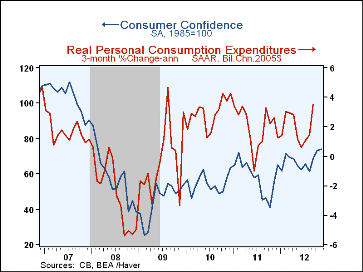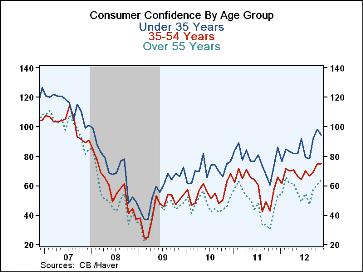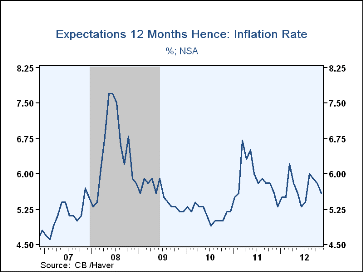 Global| Nov 27 2012
Global| Nov 27 2012U.S. Consumer Confidence Moves Higher
by:Tom Moeller
|in:Economy in Brief
Summary
The Conference Board's Consumer Confidence Index for November rose slightly to 73.7 from 73.1 in October, revised from 72.2. Consensus expectations had been 73.2 for this month. The latest figure was the highest since February 2008. [...]
The Conference Board's Consumer Confidence Index for November rose slightly to 73.7 from 73.1 in October, revised from 72.2. Consensus expectations had been 73.2 for this month. The latest figure was the highest since February 2008. During the last ten years there has been a 47% correlation between the level of confidence and the three-month change in real PCE.
The expectations component rose 1.3% to 85.1 which was its highest level since February. An increased 22.2% thought business conditions would be better in six months. Also, an increased 20.3% thought there would be more jobs and 15.9% expected higher income.Consumers' reading of the present situation was essentially unchanged m/m at 56.6, still its highest level since September 2008. Confidence in the labor market improved greatly as a lessened 38.8% reported that jobs were hard to get, the least since April. A reduced 50.0% thought that jobs were not so plentiful. A lessened 14.4% thought business conditions were good.
Expectations for inflation in the next twelve months fell m/m to 5.6% but remained up from the June low of 5.3%. The percentage of people looking for higher stock prices fell to 31.0% this month while the percent who are bearish fell to its least since April. The percentage of respondents planning to buy a home within six months fell to its lowest since April but the percent planning to buy a major appliance rose to its highest since April 2010.
Consumer confidence varied greatly by age group. Those under 35 years old tended to be the most confident, nearly the highest level since 2007. The middle aged folks were somewhat less confident but those over 55 years were the least confident about the economy.
Headline figures on consumer confidence are carried in Haver's USECON database. The Conference Board's detailed data are found in Haver's CBDB database, and the consensus expectations figure is from Actions Economics, as tabulated in the AS1REPNA database.
Displaced Workers and the Great Recession from the Federal Reserve Bank of Cleveland is available here.
| Conference Board (SA, 1985=100) | Nov | Oct | Sep | Y/Y % | 2011 | 2010 | 2009 |
|---|---|---|---|---|---|---|---|
| Consumer Confidence Index | 73.7 | 73.1 | 68.4 | 33.5 | 58.1 | 54.5 | 45.2 |
| Present Situation | 56.6 | 56.7 | 48.7 | 47.8 | 36.2 | 25.7 | 24.0 |
| Expectations | 85.1 | 84.0 | 81.5 | 28.2 | 72.8 | 73.7 | 59.3 |
| Consumer Confidence By Age Group | |||||||
| Under 35 Years | 94.5 | 98.3 | 91.8 | 27.7 | 77.3 | 70.4 | 57.0 |
| Aged 35-54 Years | 75.1 | 74.3 | 69.1 | 29.9 | 59.8 | 55.1 | 44.1 |
| Over 55 Years | 63.8 | 60.9 | 56.8 | 46.0 | 47.3 | 47.4 | 41.9 |
Tom Moeller
AuthorMore in Author Profile »Prior to joining Haver Analytics in 2000, Mr. Moeller worked as the Economist at Chancellor Capital Management from 1985 to 1999. There, he developed comprehensive economic forecasts and interpreted economic data for equity and fixed income portfolio managers. Also at Chancellor, Mr. Moeller worked as an equity analyst and was responsible for researching and rating companies in the economically sensitive automobile and housing industries for investment in Chancellor’s equity portfolio. Prior to joining Chancellor, Mr. Moeller was an Economist at Citibank from 1979 to 1984. He also analyzed pricing behavior in the metals industry for the Council on Wage and Price Stability in Washington, D.C. In 1999, Mr. Moeller received the award for most accurate forecast from the Forecasters' Club of New York. From 1990 to 1992 he was President of the New York Association for Business Economists. Mr. Moeller earned an M.B.A. in Finance from Fordham University, where he graduated in 1987. He holds a Bachelor of Arts in Economics from George Washington University.










